Садко – это имя одного из героев русских легенд и древних былин (Sadko is the name of a hero from Russian legends and ancient heroic epic). The events of this legend didn't take place in Kiev (as it often happens with ancient Russian literary traditions), but in Novgorod, a city with more freedom, self-steered, and not depending of the power of a Prince.
Sadko is a talented musician, he plays gusli like a virtuoso on the bank of the Ilmen lake, and is also a merchant.
The adventures of our hero began precisely at the moment when he set off to the sea on his boat filled with goods. During this trip, Sadko finds himself in the underwater world where he meets with the King of the Sea.
Explore our study programs to learn Russian in Russia in the shortest period of time.
Flexible group classes and individual lessons with flexible schedule and duration.
Морской владыка требует, чтобы новгородский купец поступил к нему на службу и играл для него на гуслях (the King of the Sea orders the merchant of Novgorod to entered his service and to play gusli for him). The King thought about letting his mermaid daughter married the beautiful, earthly merchant, but Sadko manages to run away from his unfortunate captivity and he succeeds in coming back to his native town.
We could draw a parallel between the heritage of Russian and Universal literature, and note несомненные черты сходства русского Садко и таких героев, как античный Одиссей и Синдбад-Мореход из сказок 1001 ночи (the undeniable similarities between Russian Sadko and such heroes as Odysseus in the Antiquity and Sindbad the Sailor from the tales of 1001 nights).
And this is precisely this ancient Russian legend, which in the distant year of 1895, gave well-known Russian composer N. A. Rimsky-Korsakov's the idea to write the opera called “Sadko”. Первый вариант оперы был завершён к 1895 году, в нем много внимания было уделено фантастическим мотивам произведения (the first version of the opera was completed in 1895, in which a great attention was spared for the composition of the fantastic motives).
But later the composition was subjected to a number of significant changes, в результате которых проблематика оперы приобрела большую социальную и национальную направленность (with the resulting problem that the opera became a major social and national composition). Rimsky-Korsakov added few characters to his story, like, for example Sadko's wife, Lyubava, appearing next to him as the image of a real Russian woman, loyal, faithful, waiting for her husband and taking care of the house. The scenes involving people have been expanded and enhanced with new episodes.
In autumn 1896, the director of the Mariinsky Theatre in St. Petersburg offered the play to be produced on stage, but Tsar Nikolai II poorly estimated the work of the composer and the project to perform it on stage was closed.
The opera was performed for the first time in Moscow, on the stage of the private theatre of S. I. Mamontov (famous patron of his time). The premiere took place on December 26, 1897.
On June 13, 2011, Sadko returned to its historical and legendary home. На территории Новгородского Кремля в день рождения Великого Новгорода прошло беспрецедентное событие (for the anniversary of the city of Novgorod, an unprecedented event happened on the territory of the Kremlin of the city). Rimsky-Korsakov's opera, under the direction of the Mariinsky Theatre, was presented to the inhabitants of the modern Novgorod and their guests in an open air performance.
We offer flexible courses of Russian language of different Intensity and duration. If you are aimed at learning Russian as fast as possible, apply for one of our Intensive Programs of the Russian language. If you are working or studying in Moscow, we offer you our part-time programs to study Russian language in the evenings or on the weekend.
The director of this special version was Alexei Stepanyuk, who, among his achievements, directed “The Queen of Spades” in London and in the open. Concerning the opera “Sadko”, the director gave his preference to the author first edition of his work (the image of Sadko's wife, Lyubava, the principal assistant to the adventures of the merchant to become the Sea Princess, is absent.)
Valery Gergiev, the world-renowned artistic director and conductor of the Mariinsky Theatre conducted this unique extravaganza.

